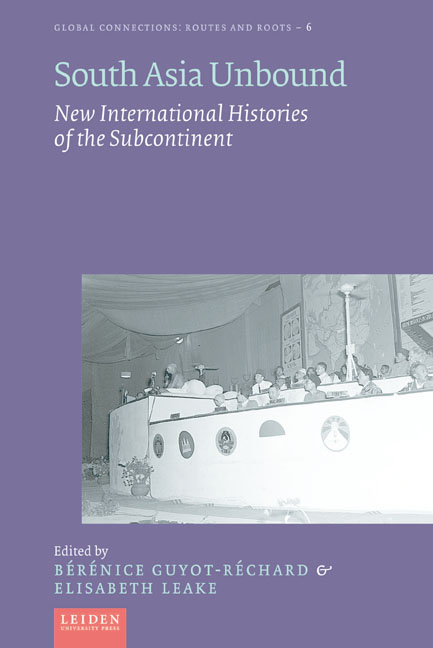Book contents
- Frontmatter
- Contents
- List of Illustrations
- List of Contributors
- Acknowledgements
- Acronyms and Abbreviations
- Introduction. South Asia Unbound
- Part I (Inter)national Orders and State Futures
- Part II From the Transimperial to the International: Lived Uncertainties
- Part III South Asian Roots of the International
- Part IV Ambivalences and Sensibilities of Internationalism
- Afterword
- Index
Chapter 11 - Culture and Progressivism in Pakistan, ca. 1950s-1970s
Published online by Cambridge University Press: 04 January 2025
- Frontmatter
- Contents
- List of Illustrations
- List of Contributors
- Acknowledgements
- Acronyms and Abbreviations
- Introduction. South Asia Unbound
- Part I (Inter)national Orders and State Futures
- Part II From the Transimperial to the International: Lived Uncertainties
- Part III South Asian Roots of the International
- Part IV Ambivalences and Sensibilities of Internationalism
- Afterword
- Index
Summary
Abstract If the formal transfer of power in August 1947 was an occasion of profound optimism in India and Pakistan, it was also accompanied by the dissatisfaction of those who felt betrayed by freedom. Blurring the lines between national and international and revealing the persistent influence of transnational ideological and mobilizational networks, this chapter traces the emergence of culture as a key battleground between the Pakistani state and its progressive critics throughout the 1950s and 1960s. Literature, poetry, music, film, and art were central to this seemingly cosmic battle between ideologies and world systems, and Pakistani communists and progressives of the time envisioned their politics in both national and international terms. In much the same way, culture was an extremely significant sphere for societal reform for the left's ideological opponents and state authorities, particularly in the context of a global Cold War in which Pakistan was the United States’ key regional ally.
Key words: Pakistan, communism, culture, Cold War, decolonization
In 1952, the Criminal Investigation Department of Punjab published two volumes titled, The Communist Party of West Pakistan in Action. Pakistani communists, it claimed, had built “a powerful party machine” out of the devastation of Partition. Migrant communists from India had succeeded in reviving a party decimated by the chaos, forced migration, and massacres that accompanied independence in 1947. Pakistan was left with a depleted communist base in poor financial shape. Nevertheless, the report's authors claimed, Pakistani communists were now fomenting a conspiracy to overthrow the government.
But more than the party or its ill-fated 1951 conspiracy, it was international communism itself that posed the biggest threat to Pakistan. Communism, the report declared, was “the most inexorable and momentous political force in the contemporary world.” Its “strength and potentialities (were) often under-estimated,” especially in Pakistan where this complacency was partly drawn from the belief that communism and Islam were “incompatible.” And yet, as the increasing influence of communism in one Muslim society after another attested to – in Malaya, Afghanistan, Iran, and Egypt – the Communist Party and its affiliates could not be underestimated. Their “insidious” techniques, “fanatical zeal,” and “single mindedness of purpose” meant that communism would continue to be a dangerous adversary.
The Communist Party of Pakistan was formally banned in 1954, but the danger its ideas posed remained a source of concern, anxiety, and paranoia for decades to come.
- Type
- Chapter
- Information
- South Asia UnboundNew International Histories of the Subcontinent, pp. 247 - 268Publisher: Amsterdam University PressPrint publication year: 2023

